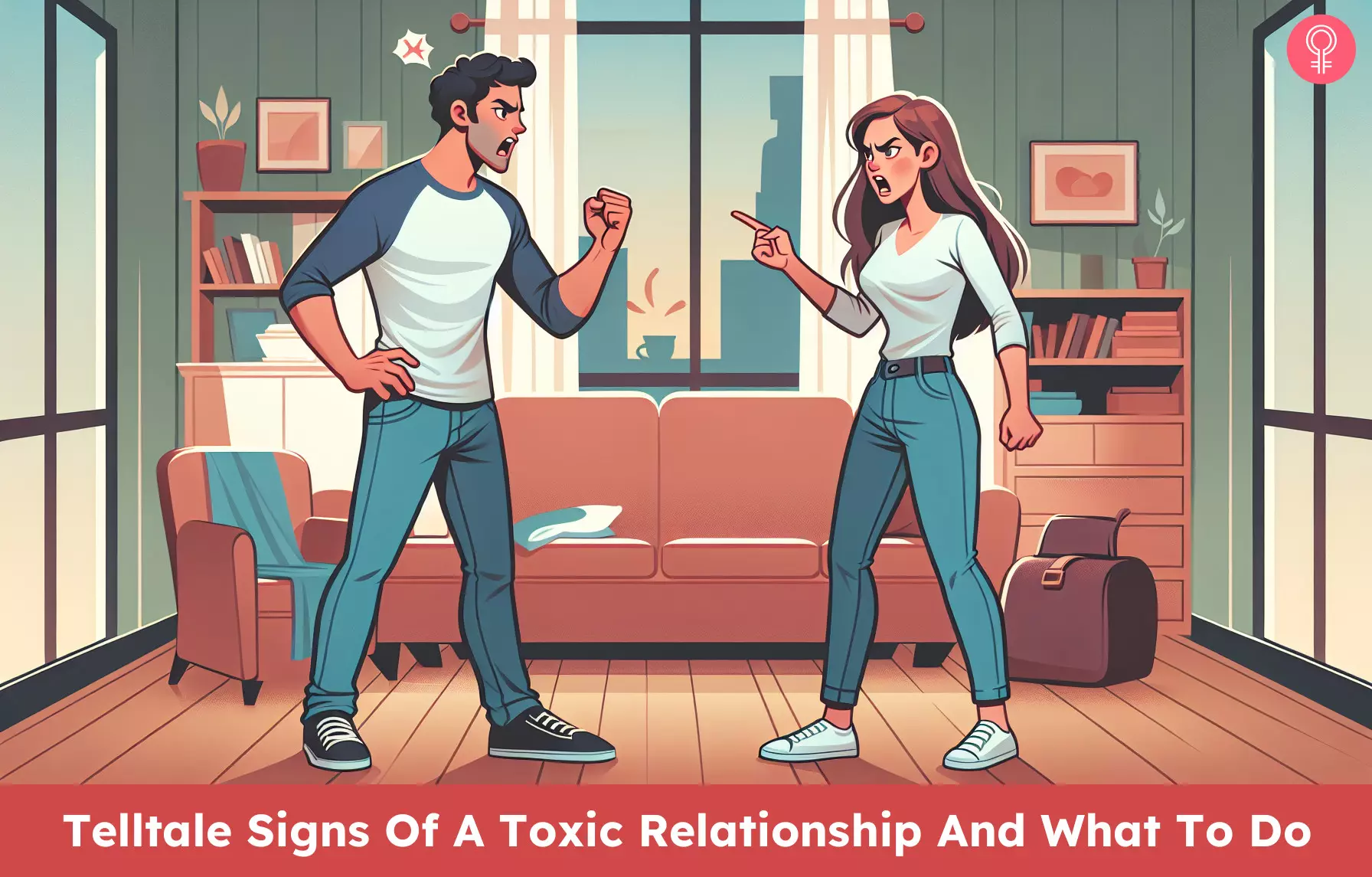26 Telltale Signs Of A Toxic Relationship And What To Do
Watch out for the obvious signs to know when it’s time to get out of the situation.

Image: Shutterstock
We ignore the most obvious toxic relationship signs when we commit to a partner. The joy of finding a partner blinds us from all the red flags. Truth be told, we tell ourselves the narrative that comforts us the most and ignore the stark reality in front of us. Soon after, the relationship starts to bring more sadness than joy and drains you out instead of fulfilling you. You start feeling suffocated and stuck. Girl, you can get out of this situation. All you have to do is open your eyes and take a brave step out of it. Here are the signs of a toxic relationship that you need to look out for and how to deal with them. Keep reading.
In This Article
What Is A Toxic Relationship?

There is no clear definition of a toxic relationship. The term toxic in a relationship is subjective. But if you are in a physically or emotionally abusive relationship, it is a toxic relationship.
But can a relationship be toxic even if it is not abusive? Well, yes. Any relationship that is harsh, harmful, manipulative, or malicious can be termed toxic. You can see issues like abusive behavior, and narcissism. You might have toxic communication with each other, an unhealthy attachment, or codependency. Such relationships can be just as harmful as abusive relationships. Being in such a relationship can lower your self-esteem and leave you in a fragile state of mind. A toxic relationship can manifest in many ways, and yet, most may often remain unaware of it.
Many a time, a relationship may begin on a perfectly happy note. But over time, it can turn into something where you feel consistently unhappy and struggle to deal with it. But how can you know for sure if your relationship has turned toxic? Check out the following signs.
Key Takeaways
- Any relationship that is harsh, harmful, manipulative, or malicious can be termed as toxic, even if there is no physical abuse.
- Toxicity in a relationship can show up in emotional, verbal, or physical forms.
- Hostile communication, lack of support, resentment, gaslighting, excessively controlling behavior and a lack of trust and transparency are some of the hallmark signs of a toxic relationship.
Signs You Are In A Toxic Relationship
The warning signs of a toxic relationship can range from being subtle to highly obvious. Toxicity in a relationship can manifest itself in emotional, verbal, or physical forms. Unfortunately, not everyone can recognize the toxic traits in a relationship. Here are some of the most toxic relationship signs you need to watch out for.
1. Hostile Communication
More often than not, the communication you both share involves criticism, sarcasm, name-calling, yelling, or even hostility. This may reach to a degree where you feel like avoiding any conversation with your partner.
2. No Support
In a healthy relationship, both partners support and encourage each other in accomplishing their individual goals.
The case is the opposite in a toxic relationship. You feel your partner is neither supportive nor happy to see you pursuing your goals.
They question whether you really need to pursue your goals. They even try to make you feel that your goals and dreams are not worth pursuing or you are not good at what you want to do.
3. Jealousy
Even the smallest of your achievements attract negativity from the other side, and you notice a jealous streak in your partner’s behavior.
They try to put you down in every possible manner and demean your achievements to make you feel unworthy of whatever you have achieved.
For instance, you may have worked hard to achieve a big promotion at work and your partner puts it down to your good luck rather than your hard work. Your partner may go on to say so in front of your friends and family as well to convince them that you never deserved the promotion.
Miguel, a blogger, shares his experience of being in a toxic relationship and how he came out of it in his blog. He urges everyone to look for red flags and act out as soon as possible. He says, “A couple of months into the long-distance relationship I get a call back from him being very aggressive without any reason. I asked as to why and all because he called on Christmas day and I couldn’t pick up the phone since I was celebrating with my family (i).”
4. Resentments And Frustrations
Resentments and frustrations happen regularly in your relationship.
Left unattended, a build-up of such emotions can take an ugly turn. For instance, you feel that your partner holds grudges against you for long. They also may remind you through their subtle actions about these resentments.
5. Controlling Behavior

A controlling partner is a hallmark of toxic relationships. Here, your partner may want to be in control of your life or whatever you want to do. They may expect you to do everything as per their wishes. They may not consider your wishes.
Have you ever felt that it is not you but your partner who is running your day? They decide whom you will meet and where. They even dictate which dress you will wear and what you will post on social media. They try to control your money and seclude you from your loved ones. So if you have felt helpless regarding finances and freedom, and you barely have a say in any decision-making, it is a clear sign your partner is controlling you.
6. Gaslighting
Gaslighting
is manipulating someone to an extent where they begin to question their own thoughts and actions. When your partner gaslights you, you end up doubting your own sanity.
For instance, your partner always questions your memory and says that you cannot remember things. They say it on your face that you never mentioned something to them when you are sure you did. This type of behavior can leave you confused and create doubts in your mind about yourself.
 Trivia
Trivia7. Blame Games
Your partner blames you for anything and everything. This could be as insignificant as the food you ordered to something serious like a lost opportunity at work over which you had no control. You tend to be always at the receiving end.
8. Lack Of Trust
Trust is the foundation for any relationship. In the absence of trust, your relationship can never flourish, and it is only a matter of time before everything crumbles down.
For instance, your partner does not trust you enough to discuss anything significant with you. They may not consult you when making major life decisions like purchasing a new property or investing money
9. You Are Too Scared To Do Anything
You are scared to do anything when your partner is around. You worry that your partner may explode at the slightest provocation or even without any provocation. You tip-toe around in the presence of your partner to avoid any confrontation.
For example, your partner may not like your friends, for insignificant reasons. If they want to visit you when your partner is around, you may not allow them for fear of a confrontation.
10. Disrespect
When your partner disrespects you and never bothers to think how it might impact you, the message is loud and clear; recognize it as a sign to walk away from the relationship. If you do not pay heed to it, you risk sacrificing your self-respect for a lost cause.
11. Endless Criticism
Your partner criticizes to belittle you and becomes judgmental about everything about you – be it your dressing sense, looks, job, attitude, way of talking, intelligence, or anything else. It may seem that nothing you do is right or good enough.
12. Constant Stress
You find yourself always on edge, which serves to indicate that something is not okay. This constant stress can have a damaging impact on your physical and mental health. You probably are never yourself in front of your partner. You become someone that your partner wants you to be, rather than being your own self.
13. You Undermine Your Needs
You ignore your needs and strive to fulfill your partner’s needs and expectations. For instance, you may have wanted to go to a beach on a holiday, but ended up staying home because your partner wanted you to. What could the problem sign be is you weren’t happy doing so, but were too worried to even discuss the same with your partner.
14. Uneven Give And Take
You are the one who always gives, and your partner is happy to take. Your partner even takes you for granted and never bothers to give back anything to you or the relationship. Being in such a one-sided relationship can leave you in a negative state of mind.
You are always the first one to text. You change your plans to suit your partner. You plan holidays on the dates that suit your partner, even when they are not convenient for you. But you don’t see your partner reciprocating.
15. Relentless Challenges
Every relationship faces some challenges. But if you face constant challenges in your relationship and your partner shows no interest in working through them, you need to heed the warning sign before it becomes too late.
16. Fear Of A Messy Drama
You are always on the tenterhooks as your partner seems to indulge in never-ending drama. It does not matter where you are or what you are doing – your partner can suddenly turn the whole atmosphere messy and leave you in a spot.
For instance, your partner can fly off the handle and shout at you in a crowded restaurant just because you were late by a few minutes.
17. A Feeling Of Uncertainty
You are not sure where your relationship is headed. Even though you want it to move in a positive direction, nothing seems to work and you feel clueless. Your partner never talks about a shared future. They keep you hanging and do not make any commitment.
18. You Avoid Each Other
If you cannot stand each other and look for excuses to avoid spending time together, it says a lot about your relationship. When you cannot bear to be with your partner, what sense does the relationship make at all?
19. You Are Forced To Defend Your Partner
Given your partner’s behavior, you are forced to make excuses and defend them in front of others. While you may not accept the reality, your family and friends underline the negative characteristics of your partner and ask you to acknowledge the same.
You may find yourself defending your partner in front of your friends saying they do not know your partner as well as you do. But in reality, you are only trying to convince yourself that your partner is right even as you know this is not the case.
20. You Feel Lonely
A feeling of loneliness tugs at your heart even though you are in a relationship. You experience a lack of intimacy and empathy from your partner. The personal connection that is so important in every relationship is missing in your case.
You may have arranged a dinner date to celebrate a milestone in your relationship, but your partner shows no interest in that. They make an excuse and give priority to other things rather than being with you to celebrate the occasion.
21. Physical Abuse
You are subjected to physical abuse. It can be in any form, including grabbing your arm tightly, pushing you hard, or shoving. If you are suffering physical pain at the hands of your partner, it is absolutely clear that toxicity exists in your relationship.
It does not matter whether your partner has hit you just once or multiple times. If physical abuse is present in your relationship, you have to take a hard call.
22. Psychological Abuse
Your partner indulges in psychological abuse to get their way around. Such abuse can take the shape of heated arguments, demeaning publicly, manipulation, lying, or refusal to acknowledge reality.
23. You Tell White Lies
You have taken to telling white lies to your partner so that there remains no need to explain your position. This happens when you are afraid that your partner may not believe you or share your point of view. Rather than making them understand, you feel it easier to lie to them and wriggle out of the situation.
For instance, you went to a mall with a friend after office. But to avoid any confrontation over this, you may simply tell your partner that you got delayed due to an office meeting.
24. Unhappiness
Happiness is missing in your relationship, and you risk turning into a negative soul. You struggle to remember the time you were truly happy with your partner. You also stop being productive.
25. Feeling Unworthy
Your partner makes you feel unworthy of everything. You start believing that you do not deserve any better. You begin thinking that many of the faults in your relationship, and the abuse you face, are acceptable.
26. Feeling Emotionally Drained
You notice your partner’s actions are unpredictable and often contradictory. This can be seen as being very moody — too affectionate in one moment, and acting distant in another. These mixed signs can leave you feeling anxious, confused, and emotionally drained. If you constantly experience this behavior, it is a clear sign of toxicity in the relationship.
Your partner may always compare you with others and demean you for not being up to their mark. They make you feel that they are doing you a favor by being in the relationship.
These are the major signs of a toxic relationship. But causes relationships to go toxic? We will explore the same in the next section.
What Causes Toxic Relationships?

Toxic relationships are an indication that something is not right between two people. There may be several causes behind a relationship turning toxic. Some of these include:
- Childhood Trauma
Children growing up in a healthy family atmosphere normally develop secure attachment styles and have faith in relationships. But children who come from dysfunctional families often witness anger, pain, bitterness, trauma, and rage while growing up. As such, they become scared of relationships.
When they enter relationships as adults, the trauma of their childhood experiences sometimes resurface. The toxicity in a relationship can be a result of this trauma. In some cases, people develop unhealthy relationship patterns as adults too.
- Unresolved Mental Health Issues
If someone has undetected or unresolved mental health issues, they can impact their well-being and the way they handle their relationships. Their emotional baggage can cause them to cross the line of healthy relationships and enter the zone of toxicity.
- Communication Breakdown
People in a relationship sometimes fail to keep the gates of communication open and transparent. As such, their relationship becomes neglected and undernourished. Faced with such a challenge, they do not take any constructive steps to overcome the issue. With time, the communication gap continues to grow and creates major issues.
- Manipulation And Vulnerability
When one of the partners in a relationship is a dominating manipulator and the other is a vulnerable individual, there can be a lack of mental and emotional objectivity. In such relationships, the manipulator can make the vulnerable one feel guilty. This guilt feeling makes the shamed party more submissive, and they fail to notice or acknowledge when the relationship turns toxic.
- Commitment Phobia
People with commitment phobia may not be willing to enter a relationship where they need to give their all. Even if they enter such a relationship, they tend to hold back and guard their vulnerability. But the other person in the relationship may not be aware of this and may expect them to be fully invested. This disparity can lead to a struggle of emotions and bring in toxicity in a relationship.
These were the most common reasons why a relationship gets toxic. But what are its effects on your mental peace and physical health? Check out the section below.
Effects Of A Toxic Relationship

In a toxic relationship, you are in a constant fight-or-flight mode. You are unable to relax and it may have negative effects on your mental and physical health. You constantly doubt your efforts and relationship which destroys your self-esteem and confidence. With increasing conflicts in the relationship, your mental state is not at peace and it even distracts you from other important relationships in your life, leading to self and social isolation. Constant stress disrupts your body’s functioning and gradually increases the risk of developing symptoms of anxiety, depression, disturbed sleep, high blood pressure and sugar levels, digestive problems, and hormonal imbalance (1).
Toxic relationships can make life miserable. But here is some good news – you may fix most of them.
How To Fix A Toxic Relationship?

Many people believe that toxic relationships cannot be fixed. But that is not always the case. If both partners are ready to accept that there is an issue in their relationship and are willing to work on it, a toxic relationship can be changed.
Here are a few effective ways to fix a toxic relationship:
- Take A Break: Sometimes, a break helps mend a relationship. Go for a short period of no contact and get some perspective about the issues in your relationship. Do this before making any effort to get things back on track. Decide what you need from the relationship and set your boundaries.
- Recognize The Problems: You can change something only when you recognize it. If you both continue to deny that there is an issue in your relationship, you will not be able to fix anything. Sit down and talk to your partner, or write down the issues and share them to initiate a discussion. Be empathetic and listen to your partner actively. This helps you deeply understand the reasons behind some behaviors and attitudes.
- Be Willing To Invest: A toxic relationship can turn healthy only when you both are ready to invest in making it better. This may need you both to get into deeper conversations or spend quality time together regularly. Stop The Blame Game: It is important to shift the focus from blaming to understanding each other. The more you reach out to each other without shooting blames, the easier it will be to make things work.
- Accept Responsibility: Engage in self-reflection and try to recognize the past behaviors that had proved to be harmful to your relationship. Both of you must look deep and acknowledge your role honestly, so that you can make things better for your future.
- Allow The Past To Rest: Avoid referring to negative incidents from the past when you are on the road to recovery. While you will have to address the issues that clouded your relationship in the past, do not carry them with you.
- Let Compassion Flow: If you have decided to give your relationship a second chance, make it a point to show compassion towards your partner. You may feel the tendency to blame your partner for the way things stand now. But if you wish to move forward, you will have to bring compassion into the picture.
- Be Open To Professional Help: Sometimes, it is not easy for partners to overcome the issues and get back on track on their own. Do not hesitate to reach out for professional help. Have a clear discussion with your partner and go for couple counseling or couple therapy.
- Maintain The Changes: Sometimes, people make all the changes, and things seem to work out fine. But, with time, the same old patterns start repeating themselves. This can be dangerous to your relationship. Always look out for such cyclic behavior. Strive to maintain the right changes in your relationship.
Types Of Toxic Relationships

Everyone wants a perfect relationship. When people think they have found their soulmate, they often overlook the behavioral traits that indicate toxicity. But it is important to be aware of the types of toxic relationships to recognize the signs early on.
Take a look at the types of toxic relationships that you need to steer clear off:
- A Relationship Involving An Abuser: Abuse in any form, be it physical, emotional, or psychological, is not acceptable in a relationship. Abuse, no matter the reason, is never justified. It is the type of bad relationship that can deeply affect your self-esteem and cause serious damage to your well-being.
- A Relationship Involving A Control Freak: Such people often begin by controlling the small and insignificant things about you that seem to be endearing initially. But they quickly graduate to having control over your every big and small move.
- A Relationship Involving A Cheater: There are no two ways about the fact that you cannot have a relationship with a cheater. If someone cheats on you, it means they do not value you and have no respect for your feelings.
- A Relationship Involving A Liar: A habitual liar can never be trusted. Whether it is the big issues or the small things, your partner must maintain honesty in the relationship.
- A Relationship Involving A Negative Soul: Such people are always engaged in looking at the negative side of things. A relationship with such a person can mean inviting negativity in your life.
- A Relationship Involving A Manipulator: Manipulators always want things to happen their way and go about achieving that. They do not consider your needs and wants and remain in their world.
- A Relationship Involving A Perfectionist: When you are with a perfectionist, you may end up never being good enough. You may go out of your way to make things work, but the other person will always find fault with your efforts and the results you achieve.
- A Relationship Involving A Competitor: A relationship means a partnership between two people who consider themselves a team. But if one begins to compete with the other, it can quickly spiral into an unhealthy turf of ego hassles.
- A Relationship Involving An Insecure Partner: An insecure person often lacks confidence in their partner as well as the relationship. Being with such a person can mean facing bouts of jealousy, doubt, and bad behavior.
- A Relationship Involving A Habitual Drinker: It is okay if your partner enjoys a drink or two over the weekends. But if you find that your partner is always high on drinks, it can spoil the fun in your relationship.
While it is possible to fix most toxic relationships, some just need to be left behind. But how can you get out of a toxic relationship?
How To Get Out Of A Toxic Relationship
Sometimes leaving a toxic relationship is the only way out. It is the best thing you can do to preserve your mental and physical well-being. Instead of blaming yourself, think of it as a step towards new beginnings. While getting out of any relationship is tough, you can help yourself by following the steps mentioned below:
- Learn To Let Go: It can be easier said than done, especially when you are emotionally attached to your partner. But you will have to learn to let go and bring closure to the relationship to be free of any emotional baggage.
- Accept That You Deserve Better: It is not enough to love someone. You also want your love and emotions to be reciprocated. If your partner is incapable of that, the best thing to do is accepting that you deserve someone better.
- Give Priority To Your Safety And Well-Being: A toxic relationship that involves physical abuse deserves to be ended as soon as possible. But there can be a concern for your safety. The best way out is to have a few friends or family members with you when interacting with your partner and declaring that the relationship is over.
- Maintain The No-Contact Rule: Once you are out of the relationship, stay away from all sorts of communication with your ex-partner. Consider saying goodbye to even social media for a few weeks. If possible, change your phone number as well.
- Indulge Yourself: When you are in a toxic relationship, your self-esteem would have hit rock bottom. To get out of the situation, surround yourself with supportive people who serve as a positive influence on your life. Indulge yourself and get involved in doing the things you love.
- Allow Yourself The Time To Heal: Once you end a toxic relationship, do not rush into anything else. Avoid getting into another rebound relationship. Allow yourself to feel the pain of the lost relationship. This will help you heal and look forward to new experiences in life.
 Quick Tip
Quick TipInfographic: 7 Major Signs Of A Toxic Relationship To Watch Out For
You need to identify the warning signs of a toxic relationship to protect your emotional well-being. It is vital to recognize some behaviors, such as emotional manipulation, control issues, untrustworthy conduct, and frequent criticism. This gives you the power to put your happiness first and create positive boundaries in your relationships. Check out the infographic below to learn more about the top 7 signs of a toxic relationship to look out for.

Illustration: StyleCraze Design Team
As much as it is important to know when and how you connect with a person, it is also important to be aware of toxic relationship signs. Respect, care, affection, and trust are important to keep a relationship going. If you find yourself feeling alone, left out, disrespected, or abused, take a stand for yourself. You can either talk to your partner and make your relationship healthy or end the relationship and move on. Whatever you choose, you will ultimately drive toxicity out of your life. Remember that your well-being is important, and hence, you must prioritize your needs and happiness. We hope the article has helped you understand and identify the toxic traits in a relationship.
Frequently Asked Questions
How do toxic relationships start?
Toxic relationships do not start out as toxic relationships; they start out just the same as regular, healthy relationships between individuals who are unaware that they are subconsciously trying to play out destructive dynamics with their romantic partners.
Why do relationships become toxic?
A lack of empathy, resentment, inverted masculine-feminine polarity, past trauma, or emotional abuse, and unfulfilled needs are some of the factors that may play a role in changing a healthy relationship to a toxic one.
Can true love be toxic?
No. In true love, partners have a deep understanding, respect, and trust towards each other. The opposite is true for relationships that become toxic. However, toxic relationships may feel like true love due to trauma bonding, or a subconscious attraction of destructive dynamics that arises from internal, unhealed wounds.
Illustration: Telltale Signs Of A Toxic Relationship And What To Do

Image: Dall·E/StyleCraze Design Team
If you are experiencing fatigue and emotional exhaustion in your relationship, then check out this video that shows the 7 key indicators of a toxic relationship and gain valuable insights.
Personal Experience: Source
StyleCraze's articles are interwoven with authentic personal narratives that provide depth and resonance to our content. Below are the sources of the personal accounts referenced in this article.
(i). MY TOXIC RELATIONSHIPhttps://mylifemrivas29.wordpress.com/2022/03/06/my-toxic-relationship/
References
Articles on StyleCraze are backed by verified information from peer-reviewed and academic research papers, reputed organizations, research institutions, and medical associations to ensure accuracy and relevance. Read our editorial policy to learn more.
- Stress And Health: Psychological Behavioral and Biological Determinants
https://www.ncbi.nlm.nih.gov/pmc/articles/PMC2568977/#:~:text=Chronic%20Stress%20Responses1975).
Read full bio of Rodolfo Parlati
Read full bio of Sneha Tete
Read full bio of Asmita De
Read full bio of Gracia Odile



























Community Experiences
Join the conversation and become a part of our empowering community! Share your stories, experiences, and insights to connect with other beauty, lifestyle, and health enthusiasts.